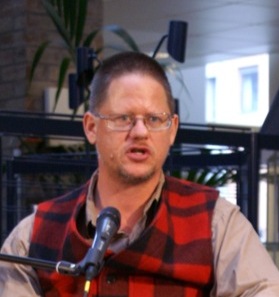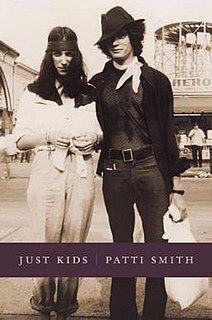When a person assumes the family name of their spouse, that name replaces the person's previous surname, which in the case of the wife is called the maiden name, whereas a married name is a family name or surname adopted by a person upon marriage.

In some cultures, a surname, family name, or last name is the portion of one's personal name that indicates their family, tribe or community.

Xuefei Jin is a Chinese-American poet and novelist using the pen name Ha Jin (哈金). Ha comes from his favorite city, Harbin. His poetry is associated with the Misty Poetry movement.

Carlos Fuentes Macías was a Mexican novelist and essayist. Among his works are The Death of Artemio Cruz (1962), Aura (1962), Terra Nostra (1975), The Old Gringo (1985) and Christopher Unborn (1987). In his obituary, The New York Times described Fuentes as "one of the most admired writers in the Spanish-speaking world" and an important influence on the Latin American Boom, the "explosion of Latin American literature in the 1960s and '70s", while The Guardian called him "Mexico's most celebrated novelist". His many literary honors include the Miguel de Cervantes Prize as well as Mexico's highest award, the Belisario Domínguez Medal of Honor (1999). He was often named as a likely candidate for the Nobel Prize in Literature, though he never won.

William Tanner Vollmann is an American novelist, journalist, war correspondent, short story writer, and essayist. He won the 2005 National Book Award for Fiction for the novel Europe Central.
Spanish naming customs are historical traditions that are practised in Spain for naming children. According to these customs, a person's name consists of a given name followed by two surnames. Historically, the first surname was the father's first surname, and the second the mother's first surname. In recent years, the order of the surnames in a family is decided when registering the first child, but the traditional order is still usually chosen. Often, the practice is to use one given name and the first surname most of the time ; the complete name is typically reserved for legal, formal, and documentary matters. Both surnames are sometimes systematically used when the first surname is very common to get a more customized name. In these cases, it is even common to use only the second surname, as in "Lorca", "Picasso" or "Zapatero". This does not affect alphabetization: "Lorca", the Spanish poet, must be alphabetized in an index under "García Lorca", not "Lorca" or "García".
William Joseph Kennedy is an American writer and journalist who won the 1984 Pulitzer Prize for his novel Ironweed.
A bookworm or bibliophile is an avid reader and lover of books.

Lydia Davis is an American short story writer, novelist, essayist, and translator from French and other languages, who often writes extremely brief short stories. Davis has produced several new translations of French literary classics, including Swann’s Way by Marcel Proust and Madame Bovary by Gustave Flaubert.
Allan Gurganus is an American novelist, short story writer, and essayist whose work, which includes Oldest Living Confederate Widow Tells All and Local Souls, is often influenced by and set in his native North Carolina.
Michael Silverblatt is a literary critic and American broadcaster who has been the host of Bookworm, a nationally syndicated radio program focusing on books and literature, since 1989.
Christopher Sorrentino is an American novelist and short story writer of Italian and Puerto Rican descent. He is the son of novelist Gilbert Sorrentino and Victoria Ortiz. His first published novel, Sound on Sound (1995), draws upon innovations pioneered in the work of his father, but also contains echoes of many other modernist and postmodernist writers. The book is structured according to the format of a multitrack recording session, with corresponding section titles.
Aclla, also called Chosen Women, Virgins of the Sun, and Wives of the Inca, were sequestered women in the Inca Empire. They were virgins, chosen at about age 10. They performed several services. They were given in marriage to men who had distinguished themselves in service to the empire; they produced luxury items, weaving fine cloth, preparing ritual food, and brewing the chicha (beer) drunk at religious festivals; and some, the most "perfect", were selected as human sacrifices for religious rites. Others lived out their lives in a monastic environment.
Alexander Louis Theroux is an American novelist and poet. He is known for his novel Darconville's Cat (1981), which was selected by Anthony Burgess for his Ninety-Nine Novels: The Best in English Since 1939 – A Personal Choice in 1984 and by Larry McCaffery for 20th Century’s Greatest Hits.

Just Kids is a memoir by Patti Smith, published on January 19, 2010, documenting her relationship with artist Robert Mapplethorpe.
Asarpay, also known as Sarpay (16th-century), was an Inca priestess in a cult dedicated to Apurima, the personified version of the Apurimac River, during the 1500s.
Zerogram Press is dedicated to publishing contemporary literary fiction written in English. It also publishes literary criticism and essays.
Irene Silverblatt is a professor of cultural anthropology at Duke University. Her work revolves mainly around race and religion in Peru during the Spanish Inquisition. Silverblatt earned her PhD at the University of Michigan.
Meeting Daddy is a 2000 film written and directed by Peter Gould. It is notably the last of actor Lloyd Bridges' 160 films, and was posthumously released. The plot involves a struggling New York-based screenwriter travelling to Savannah, Georgia to meet his girlfriend's eccentric family. It also explores themes of aging.
Manuel Bautista Perez was a Portuguese-born merchant, slave trader and multi-millionaire active in Africa, Europe, the Americas and Asia. Perez became extremely wealthy and was the richest man in Peru during his lifetime due to his involvement in the Atlantic slave trade: according to the Jewish Encyclopedia, Perez amassed a fortune which would have been the equivalent of $1,000,000 in 1906. During this time, Portuguese-born merchants held the asiento to provide African slaves to the territories of the Spanish Empire in the Spanish Americas.





